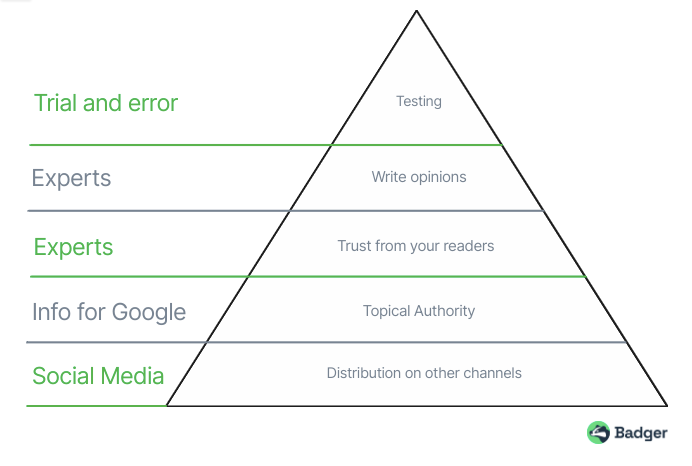5 Underrated SEO Tactics You Need to Try
The article "5 underrated SEO tactics you need to try" highlights the importance of thinking outside the box to succeed in the constantly changing world of SEO.

Everyone knows that succeeding in an industry that's constantly changing can be challenging, but it's not impossible.
FastCompany shows businesses can gain a competitive edge by approaching things differently. In other words, companies need to innovate and think outside the box to stay ahead of the game.
In this blog post, I'll cover five underrated SEO tactics that form the foundation of many successful website strategies.
Note: There are many versions of the pyramid; the version presented here is designed to showcase five often overlooked SEO tactics that can significantly impact a website's search engine ranking and overall success.
Distribution on other channels
The first SEO tactic is distributing your website's content on other channels.
Using social media can greatly benefit your website's SEO efforts.
Since a majority of visitors often discover websites through social media profiles, creating a strong presence on popular platforms like Twitter, LinkedIn, or Facebook is a good place to start.
Sharing relevant content on these platforms can attract visitors to your website and improve your search engine rankings.
Plus, having social media profiles is important in building brand awareness for your business.
Topical Authority
The second layer of the pyramid is topical authority, a basicsemantic SEO strategy that can help your site gain massive traffic.
This means becoming an expert in a specific topic or niche.
Creating high-quality content demonstrating your expertise can establish you as a thought leader in your industry. This, in turn, can attract more visitors and improve your website's search engine ranking.
For instance, if your website frequently publishes "vegan recipes," and has a strong backlink profile from other reputable websites that also cover vegan recipes, Google is likely to recognize the website as having topical authority on the subject.

This can result in the website appearing higher in search engine results pages (SERPs) for relevant queries, driving more traffic and potentiallymore leads and conversions.
On the other hand, a website that only occasionally covers vegan recipes and doesn't have a strong backlink profile in that area is less likely to have topical authority on the subject, and may not rank as well in SERPs for relevant queries.
Trust from your readers
The third layer of the pyramid is building trust with your readers. This includes using trustworthy sources, citing your sources, and providing accurate information.
By establishing trust with your readers, you can increase the likelihood that they will share your content and link to your website, boosting your search engine ranking.
Here's why:
- User engagement: When your website is seen as trustworthy, users are more likely to engage with your content, share it, and spend more time on your website. This can increase user signals like click-through rate (CTR), dwell time, and bounce rate, which are important factors in SEO rankings.
- Backlinks: Trusted websites are more likely to earn backlinks from other authoritative websites, which is one of the most important ranking factors in SEO. Backlinks from other trustworthy websites signal to search engines that your website is also trustworthy, which can improve your search engine rankings.
- Repeat visits: When users trust your website, they are more likely to return to it in the future. This can increase the frequency of visits and the likelihood of conversions as users become familiar with your brand and the value you provide.
- Brand reputation: A trusted website is more likely to have a positive reputation and be viewed as a leader in its industry. This can increase brand awareness and establish your website as a go-to resource for information and solutions.
Write opinions
The fourth layer of the pyramid is writing opinions. This means expressing your unique perspective on a topic.
Many niche/content websites I am familiar with do not incorporate opinion-based content.
Yet, it's possible to meet a good search engine ranking for certain keywords by creating editorial articles and seeking backlinks.
In fact, offering constructive criticism (and supporting evidence) can be an effective strategy to establish thought leadership, engage readers, and encourage them to share your content.
Testing
The top layer of the pyramid is testing. This means constantly experimenting with new SEO tactics to see what works best for your website. Do something and see what happens. Test again. Measure. Test.
Different strategies will help you identify what drives the most traffic and improve your website's search engine ranking over time.
One important aspect of testing is to make sure you are measuring the right metrics.
While traffic and rankings are important, they don't necessarily translate to conversions and revenue. By tracking and measuring conversion rates and other relevant metrics, you can make sure that your SEO efforts are ultimately contributing to the success of your business.
And one last thing - did you wait long enough after publishing?
Here's a sad (but true) fact: SEO takes time.
And that's a wrap!
Remember to sign up and use Badger for SEO reports!
 By Gustavo Sucre
By Gustavo Sucre